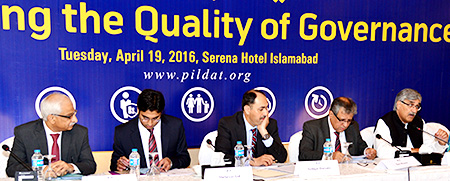| |
- Experts discuss the best methods of Measuring the Quality
of Governance
- Greatest challenge to Governance assessment is lack of
credible and compiled data
- More engagement with citizens necessary to improve Governance
- Aspects such as Judicial Efficiency must be added to PILDAT
Framework
April 19: PILDAT held a Roundtable Discussion
on ‘Measuring the Quality of Governance’ to discuss the recent experiences
of its Governance Assessment of the Federal and Provincial Governments 2014-2015.
Representatives from the Federal and Provincial Governments provided their recommendations
to PILDAT for improving the framework and highlighted the shortcomings in data
collection they themselves face that become an impediment to accurately monitor
performance.
In addition, a number of Governance experts
were also present as discussants and provided input to PILDAT, in particular,
stressed upon the inclusion of Judicial Efficiency to the Governance Assessment
framework.
The Speakers included Dr. Ijaz Munir,
ASPM, Federal Government of Pakistan, Mr. Zulfiqar Durrani,
Secretary (Planning), Planning and Development Department, Government of Balochistan,
Mr. Shehryar Gul, Deputy Coordinator, Performance Management
and Reforms Unit (PMRU), Government of Khyber Pakhtunkhwa, and Mr. Khalid
Mehmood Siddiqi, Senior Chief (Physical Planning and Housing), Planning
and Development Department, Government of Sindh. The representative from the
Punjab Government was unable to attend the session therefore Dr. Ijaz Munir
discussed Governance in the Punjab on their behalf.
Dr. Ijaz Munir while addressing
potential gaps in PILDAT’s assessment, said that while it is important
to measure performance against set targets, it is also important to study newly
started and ongoing projects. Furthermore, while PILDAT assesses Governance
based on performance in different sectors, the true essence of the job that
ministries are performing needs to be captured in the assessment.
Mr. Zulfiqar Durrani provided
his input on how PILDAT’s ongoing assessment could further be refined.
He argued that think-tanks in Lahore and Islamabad may not be necessarily able
to acquire credible data from a Province as remote as Balochistan. PILDAT must
have a team present in Quetta to measure Governance accurately in Balochistan.
He believed that main challenge for the country is lack of credible data. It
is highly unfortunate that the census has not been held for twenty years in
Pakistan. It is also crucial to include prosecution and judiciary in the Governance
framework used by PILDAT. PILDAT may also develop a mechanism whereby the level
of equity in the country can be measured and assessed, with attention on marginalization
of certain socio-economic groups.
Mr. Shehryar Gul represented
the Government of Khyber Pakhtunkhwa at the Roundtable Discussion. Mr. Gul shared
a presentation on how the PMRU measures performance and implementation in the
KP Government. The PMRU is conducting performance audits at the District and
Provincial levels. A Key Performance Indicator (KPI)-based monitoring system
covers 32 Provincial departments through 700 KPIs. Geographic Information System
(GIS) data is also used for cross-sectional analysis. Data is collected on a
monthly basis and a final presentation is given every quarter to the Chief Secretary.
The Districts are rated and analysed on the basis of this data and the processed
information is made available online for citizens. The KP Government has created
a Citizens Portal, which is also available as an Android application. Similarly,
citizens can now issue complaints through the Portal. Mr. Gul believed that
engagement with citizens and transparency are indispensable to the performance
of any Government.
Mr. Khalid Mahmood Siddiqui
represented the Government of Sindh. Mr. Siddiqui believed that data collection
strategies could be further simplified by PILDAT. He recommended that PILDAT
might send one data collector to each Province to interact with all responsible
departments. However he agreed with fellow speakers that there are major limitations
at the Provincial level on the availability and compilation of data. The representative
of the Sindh Government suggested possible additions to PILDAT’s framework,
including Judicial Efficiency and Accountability, Revenue Generation, Regional
Equity, streamlining Sustainable Development Goals and Human Rights, and Road
Infrastructure.
The discussants at the Roundtable felt that
PILDAT’s Governance Assessment is a useful exercise that highlights many
areas and challenges of Governance that are otherwise not assessed. However,
a number of aspects remain missing from PILDAT’s framework. Dr.
Gulfaraz Ahmed, Former Secretary, Ministry of Petroleum and Natural
Resources, believed that one such area is the state of affairs at the grassroots
level: have new policies brought any sort of relief to citizens? Discussants
were also of the view that PILDAT’s framework, though comprehensive, should
have different weightage for different parameters. It was overwhelmingly felt
that the judicial and prosecution system should be assessed as part of PILDAT’s
framework.
Mr. Ahmed Bilal Mehboob, President,
PILDAT, in his opening remarks, presented the methodology used in PILDAT’s
Governance Assessment, which for the Federal Government is based on improvement
and decline in performance indicators in 2014-2015 from 2013-2014. Alternatively,
the performance of the four Provinces is measured through improvement or decline
from 2013-2014 to 2014-2015, scored relative to each other. For details, please
see the complete Score Cards for the Federal and Provincial Governments which
can be accessed on the PILDAT Website: www.pildat.org |
|
| |

From left to right Mr. Khalid Mahmood Siddiqui, Senior Chief (Physical Planning & Housing), Planning & Development Department Government of Sindh; Mr. Shehryar Gul, Deputy Coordinator, Performance Management & Reforms Unit, Government of Khyber Pakhtunkhwa; Mr. Zulfiqar Durrani, Secretary (Planning), Planning & Development Department, Government of Balochistan; Dr. Ijaz Munir, Additional Secretary to the Prime Minister, Federal Government; and Mr. Ahmed Bilal Mehboob, President, PILDAT. |
|